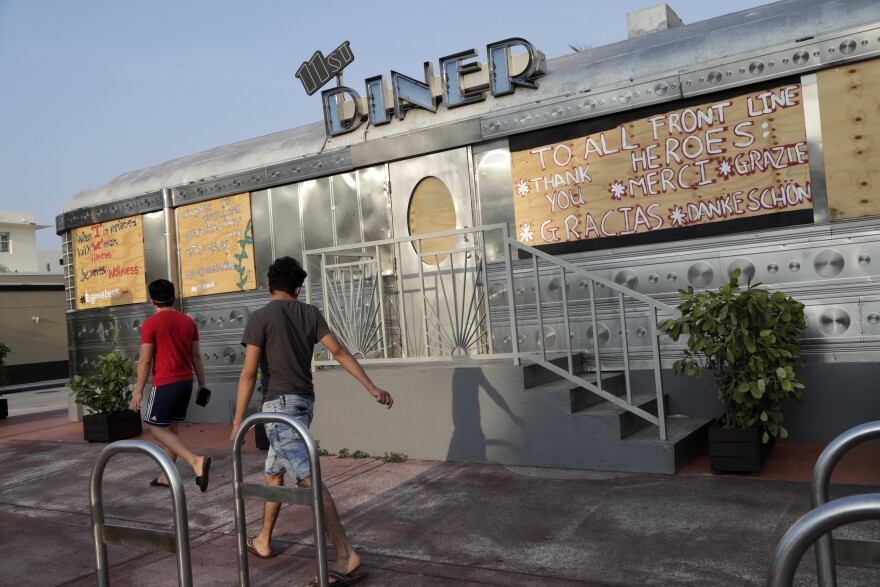Shipmonk was used to hiring people fast to fill jobs in its expanding Fort Lauderdale wareshouse. Since COVID-19 hit, the company has been telling some job applicants to show up for their first day of work without even an interview.
"We're doing a pretty speedy and immediate hiring process for those looking for warehouse work," said Shipmonk Chief People Officer Donna DeChant.
In these uncertain times, you can rely on WLRN to keep you current on local news and information. Your support is what keeps WLRN strong. Please become a member today. Donate Now. Thank you.
Shipmonk works with small-and-medium sized Internet retailers in helping them ship out their merchandise. With consumers at home and shopping on the Internet, Shipmonk’s business has been booming — up 10 percent in March and 50 percent in April. DeChant says they're making 10 to 15 job offers a week, and applicants are coming from industries hit hard by the virus.
"We have displaced workers from the restaurant industry, from hospitality, from various retail organizations that have shut their doors and no longer have work available for people. That was not the case before the pandemic. We tended to see folks who had done some warehouse work."
The jobs start at $10 an hour. That’s $400 for a full 40-hour week before taxes — less than the federal government’s unemployment booster of $600 a week. But DeChant says with benefits, Shipmonk has not had a tough time filling the jobs.
South Florida’s job market has been hit particularly hard because of the number of people working in restaurants, bars and hotels. Those businesses were shut down, or mostly shut down almost two months ago, putting tens of thousands of people out of work.
Nationwide, the U.S. economy lost 870,000 jobs in March and another 20.5 milion in April. The speed and breadth of the job destruction has been breathtaking, especially in the hospitality industry. The number of hospitality jobs in the country fell by 47 percent last month according to the Bureau of Labor Statistics.
"In the last couple of years, we've had the healthiest job market we've had probably in the history of the country," said Right Management Florida Caribbean Chairman Tom Shea. "Now that's come to a sudden halt."
When a company has to lay off workers, the company Shea founded may get a call. Among the work his firm does is outplacement services — helping employees transition into new work through retraining, workshops and recruiting.
"If you're an accountant and you happen to be working in the hospitality industry, those skills are very transferable to other things," he said.
South Florida's hospitality workers may be forced to look for jobs in other industries. In phased reopening plans, restaurants will only be allowed to fill a quarter of their dining rooms. Bars will remain closed for the time being, and hotels will have to adapt practices to adhere to social distancing guidelines.
It may not be until June 1 when hotels in Miami-Dade are allowed to officially restart according to Greater Miami and the Beaches Hotel Association CEO Wendy Kallergis. And even then, it may take weeks for some to welcome guests.
"While some can open in a couple of days, others will take two weeks," she said. "There's a lot of guidelines with safety and cleanliness, sanitation for the property, as well as training for the employees. It's going to be different."
Hotels and restaurants were ordered closed for guests in late March. Hotels could still house essential workers when necessary. Restaurants had to pivot to take-out and delivery. The ripple effect meant tens of thousands of full and part-time workers lost their jobs or were furloughed. How fast that work returns will depend upon how much those businesses are allowed to reopen and how quickly customers return.
"Quite honestly, I just I don't see how the small restaurants are able to survive if they have to rehire the staff back," said FIU Chaplin School of Hospitality Dean Michael Cheng. In the first phase of the state's reopening, restaurants could fill up to 25 percent of their dining rooms. Initially, Miami-Dade, Broward and Palm Beach counties were excluded from the state's reopening rules, but Palm Beach was granted permission to begin restarting. Broward and Miami-Dade leaders are discussing starting their phased reopening on May 18.
"Once you put dining-room service back in the equation, the number (of employees) then goes up," said Cheng. "If you're not making 100 percent of your full revenue that's possible. If you're only making 25 percent, you have to make the decision at that point. Is it worth opening at 25 percent or do you wait and see?"



